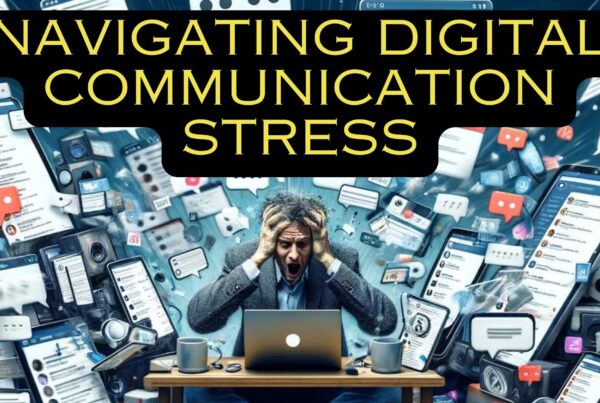The Importance of Taking Time Off Work for Mental Health and Work-Life Balance
Overcoming Barriers and Prioritizing Your Well-Being
Nowadays, it feels like our work can demand more and more from us. Maintaining good mental health is crucial for our overall well-being. However, many individuals find it challenging to take time off work to prioritize their mental health due to various barriers and concerns. In this article, we will explore the importance of taking time off for mental health and work-life balance and provide practical tips for overcoming these challenges.
The Significance of Mental Health Breaks
It is no secret that our mental health affects every aspect of our lives, including our ability to perform well at work. Studies have shown that individuals who take regular breaks to focus on their mental well-being experience lower levels of stress, increased job satisfaction, and improved overall mental well-being1. By giving ourselves the opportunity to recharge and rejuvenate, we become more productive, engaged, and resilient.
Overcoming Barriers and Concerns
Despite the clear benefits, many people hesitate to ask for time off for mental health due to various barriers and concerns. Let’s address some of these challenges and provide strategies for overcoming them.
Barriers to Taking Time Off
Fear of Stigma and Judgment
One common barrier is the fear of stigma and judgment from employers and colleagues. Many individuals worry that requesting time off for mental health may be viewed negatively or impact their career prospects. However, it is important to remember that employers have a vested interest in the well-being of their employees. Research has shown that employees who prioritize self-care and mental health are not only happier and healthier but also more engaged and productive at work. By reframing the conversation around mental health as a vital aspect of overall well-being, we can help reduce stigma and promote understanding.
Communication Challenges
Another concern is effectively communicating the need for time off to employers. Individuals may feel uncomfortable discussing their mental health struggles or may struggle to find the right words to convey their needs. It can be helpful to plan and prepare for these conversations by gathering relevant research and evidence that supports the importance of mental health breaks. Frame the discussion around work-life balance and the positive impact it can have on overall productivity and well-being.
Strategies for Prioritizing Mental Health
Educate Yourself and Advocate for Mental Health
Start by educating yourself about your workplace’s policies regarding time off and mental health support. Familiarize yourself with any available resources or programs. By being knowledgeable about your rights and options, you can confidently advocate for your mental health needs. Remember, prioritizing your well-being is not only beneficial for you but also for the overall work environment.
Open and Transparent Communication
Encourage open conversations about mental health in your workplace. By sharing personal experiences and challenges, you contribute to reducing the stigma surrounding mental health. When discussing your need for time off, emphasize the importance of work-life balance and the positive impact it can have on your performance and well-being. Use relatable metaphors to convey the significance of mental well-being, such as “nurturing our minds, just like we care for delicate flowers, allows us to bloom and thrive.”
Seek Support from Mental Health Advocates
Identify any mental health advocates or resources available within your organization. These individuals can provide guidance, support, and a listening ear. Reach out to them for assistance in navigating the process of taking time off and accessing mental health support. Having someone in your corner can make the journey more manageable and less daunting.
Creating a Supportive Work Environment
To foster a culture that prioritizes mental health, organizations can take proactive steps to create a supportive work environment. Here are some strategies:
Leadership by Example
Leaders and managers should openly share their own mental health challenges and experiences. By leading by example, they create a safe space for employees to discuss their own struggles and seek support without fear of judgment.
Reframing the Conversation
Shift the focus from mental health “illness” to mental health challenges that individuals face daily. This reframing reduces stigma and encourages employees to seek help and support when needed.
Workplace Mental Health Advocates
Appoint individuals within the organization as mental health advocates. These advocates can offer guidance, resources, and a supportive presence for colleagues who may be struggling. Having dedicated individuals who understand the importance of mental health can foster a sense of community and support.
Dedicated Time Off for Mental Health
Consider implementing specific leave days or policies that explicitly acknowledge and support mental health breaks. These designated days send a powerful message that mental well-being is a priority and encourage employees to take the necessary time to care for themselves.
Time Off Work for Mental Health
Prioritizing mental health and work-life balance is crucial for our overall well-being and productivity. Taking time off work for mental health not only benefits individuals but also creates a more supportive and productive work environment. By overcoming barriers, advocating for mental health, and fostering open conversations, we can create a culture that values and supports mental well-being. Remember, your mental health matters, and taking care of it is an investment in your overall happiness and success.
Release Hypnosis Melbourne Hypnotherapy
Since 2016, Lawrence Akers has been working under the name Release Hypnosis offering Hypnotherapy and ACT based work to the people of Melbourne or an online service. Based on St Kilda Rd, Release Hypnosis is an easy and convenient location to get to and accessible by the ANZAC station train and tram stop. Release Hypnosis can help with a wide range of presenting issues, and I offer a free 30 minute no obligation discovery call for those who are unsure if hypnotherapy is the right way forward for them.
References for ‘The Importance of Taking Time Off Work for Mental Health’
- National Institute for Occupational Safety and Health. (n.d.). Taking Time Off Can Improve Your Health. Retrieved from https://www.cdc.gov/niosh/topics/workschedules/health.html
- Lepine, J. A., Podsakoff, N. P., & LePine, M. A. (2005). A Meta-Analytic Test of the Challenge Stressor–Hindrance Stressor Framework: An Explanation for Inconsistent Relationships Among Stressors and Performance. Academy of Management Journal, 48(5), 764–775.
Book Your FREE 30 Minute Consultation With Release Hypnosis NOW!
You may also like to read:
Discovering Purpose and Values: A Path to Mental Well-being
Can’t Visualise in Hypnosis? Here’s What You Can Do Instead.
Release Hypnosis Celebrates 8 Years!
What Is The Success Rate of Hypnosis?
Release Hypnosis Melbourne Hypnotherapy is accessible for people in: Abbotsford, Armadale, Albert Park, Balwyn, Bentleigh, Black Rock, Box Hill, Brighton, Brunswick, Bulleen, Bundoora, Camberwell, Canterbury, Carnegie, Caulfield, Chadstone, Cheltenham, Clayton, Coburg, Collingwood, Deer Park, Doncaster, Elsternwick, Eltham, Elwood, Epping, Essendon, Fairfield, Fitzroy, Footscray, Glen Iris, Glen Waverley, Glenhuntly, Greensborough, Hampton, Hawthorn, Heidelberg, Highet, Ivanhoe, Kew, Kooyong, Lalor, Laverton, Lower, Plenty, Macleod, Malvern, Middle Park, Moonee Ponds, Melbourne, Moorabbin, Mount Waverley, Murrumbeena, Northcote, Oakleigh, Ormond, Parkville, Pascoe Vale, Port Melbourne, Prahran, Preston, Richmond, Rosana, Sandringham, South Yarra, South Melbourne, Spotswood, St Albans, St Kilda, Surrey Hills, Templestowe, Thornbury, Toorak, Tullamarine, Williamstown, Yarraville, North Melbourne, Windsor, East Melbourne, Melbourne, Melbourne CBD, Melbourne 3004








